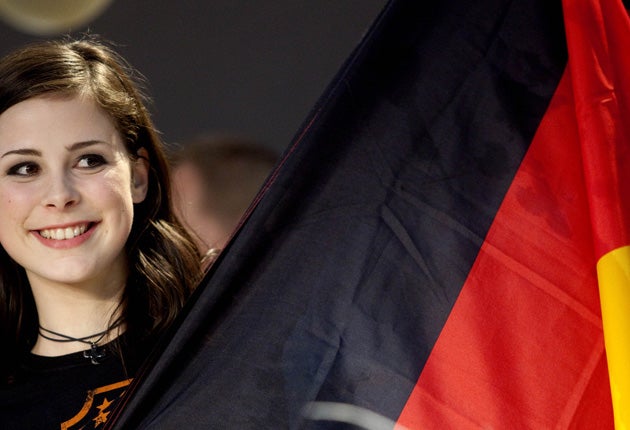Germany discovers a new heroine
Street parties and firework displays greet 19-year-old Lena Meyer-Landrut's Eurovision triumph, her country's first since 1982. But the UK's dismal run in the competition continues, writes Tony Paterson

Your support helps us to tell the story
From reproductive rights to climate change to Big Tech, The Independent is on the ground when the story is developing. Whether it's investigating the financials of Elon Musk's pro-Trump PAC or producing our latest documentary, 'The A Word', which shines a light on the American women fighting for reproductive rights, we know how important it is to parse out the facts from the messaging.
At such a critical moment in US history, we need reporters on the ground. Your donation allows us to keep sending journalists to speak to both sides of the story.
The Independent is trusted by Americans across the entire political spectrum. And unlike many other quality news outlets, we choose not to lock Americans out of our reporting and analysis with paywalls. We believe quality journalism should be available to everyone, paid for by those who can afford it.
Your support makes all the difference.Germany was in frenzied "Lenamania" yesterday as the nation celebrated its first Eurovision Song Contest win in almost 30 years with the song "Satellite" – a hit sung in rather mangled English by a sweet and self-effacing 19-year-old called Lena Meyer-Landrut.
At the other end of the results table was another 19-year-old: the UK's Josh Dubovie, whose performance of the Stock and Waterman-penned "That Sounds Good to Me" received just 10 points.
Street parties and firework displays were held to mark the triumph achieved for Germany in Oslo on Saturday night by a school student unknown a year ago who completed the German equivalent of A-levels while rehearsing for the contest.
"Lovely Lena", as she is now almost universally nicknamed, was discovered on a television casting show late last year. Millions of television viewers followed her progress in Oslo together with tens of thousands of Germans who watched the contest broadcast on video screens in town squares and at other outdoor venues.
The Bild am Sonntag newspaper caught the prevailing mood with a front-page headline which seemed to allude to the Euro crisis. "Europe likes us after all!" the paper proclaimed after Lena won by dint of 76 points supplied by viewers in European countries outside Germany.
In a statement, Chancellor Angela Merkel congratulated Germany's latest pop heroine on her "super success" in Oslo. "With her naturalness and warmth, she is a wonderful example of young Germany," Ms Merkel added.
Lena, the granddaughter of a former German diplomat, comes from a middle-class home in Hanover and was brought up by a single-parent mother. She has won huge popularity in Germany because of her modest, self-effacing manner and her refusal to comply with pop-industry hype.
"This definitely was not to be expected," she declared after winning the contest. "I am just shattered. I just can't believe it," she added. "Do I really have to sing it again?" she asked as the German flag was thrust into her hand on stage in Oslo as her victory was announced.
Her win is the first Eurovision victory for Germany in 28 years. Back in 1982, the contest was won by the pious-looking "Nicole" with her song "Ein bisschen Frieden" ("A Little Peace"), which came out at the height of the then-West German peace movement's protests against the deployment of US cruise missiles in Germany.
Join our commenting forum
Join thought-provoking conversations, follow other Independent readers and see their replies
Comments